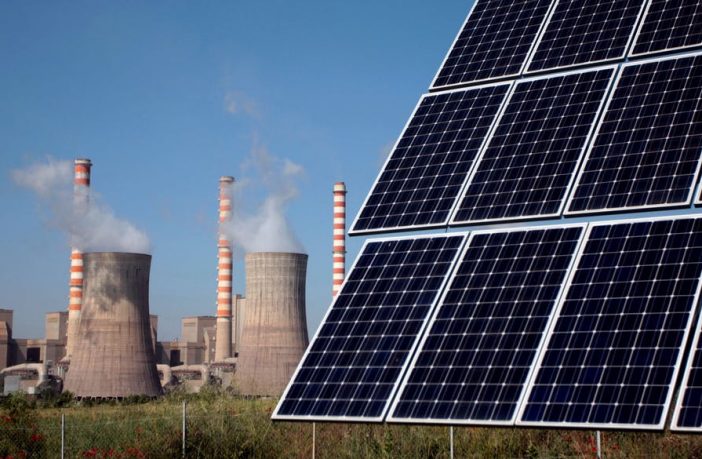- As South Africa is plunged into loadshedding this week again due to an old, unreliable and polluting coal fleet, 350Africa.org welcomes the move by Eskom towards renewable energy.
In an exclusive presentation on Tuesday 26 October, Eskom CEO Andre De Ruyer laid out the details of Eskom’s plans to transition towards a more renewable energy future. De Ruyter highlighted how up to R500 billion in funding would be needed to help fund the transition to renewables. The funding would also support local communities and workers dependent on coal for their livelihoods to transition to alternative livelihoods.
Renewables are the fastest solution to our loadshedding crisis. In addition, they are also the most job-creating, affordable and cleanest form of energy that can help us tackle our economic and environmental crises simultaneously.
De Ruyter also talked about how the transition could potentially be financed by drawing on international climate finance, which would also help Eskom to deal with its currently unsustainable debt burden. As such, the move could help rescue Eskom, if done right.
“If done right, Eskom could pave the way for a Green New Eskom suited to the demands of the 21st century. It could help spur on a rapid and just transition to a renewable energy future that works for all. To ensure that we can make progress, the Climate Justice Coalition has been calling for a Green New Eskom, and protesting the biggest obstacle to change, namely Minister Mantashe and his Department of Mineral Resources and Energy. They want to keep us locked into outdated, expensive and polluting coal, rather than embracing desperately needed change that would create a cleaner, more affordable and job-creating energy future,” Alex Lenferna, Campaigner, 350Africa.org.
Eskom’s financial and environmental sustainability is crucial to ensure reliable electricity production and that South Africa can do its part to stop catastrophic climate change. At the same time, civil society has raised concerns about what conditions might be imposed by financiers, and wants to see more details on how it will be funded and with what conditions.
Civil society groups under the Climate Justice Coalition have been calling for a Green New Eskom, and this could be the beginning of that transformation. However, they also have raised their concerns that Eskom is not transitioning fast enough. They have argued that a much more accelerated transition to renewables is needed to solve our energy crisis and to reduce Eskom’s pollution at the speed needed to tackle the climate crisis.
Eskom is investing heavily in gas which they argue is a polluting and expensive fossil fuel, another issue raised by civil society organisations. Spending on new gas may undermine the goals of cleaning up the energy system and removing our reliance on volatile international gas and coal markets, which are plunging countries in Europe into energy crises.
What needs to be ensured now is that a rapid and just transition to renewable energy drives Eskom’s vision. A just transition requires that workers and communities dependent on coal are not left behind in the transition, but are rather invested in and are brought into the new economy. On this front, 350Africa.org cautiously welcomes plans to repurpose Komati power station to become a hub to produce solar power and microgrids for renewable energy.
As we move forward with a just transition, it is also important that it is a transparent and participatory process including all stakeholders from civil society, affected workers and communities. A just transition would also include more social ownership instead of widespread privatisation of renewable energy.
Author: Shandukani Mulaudzi – 350Africa.org












